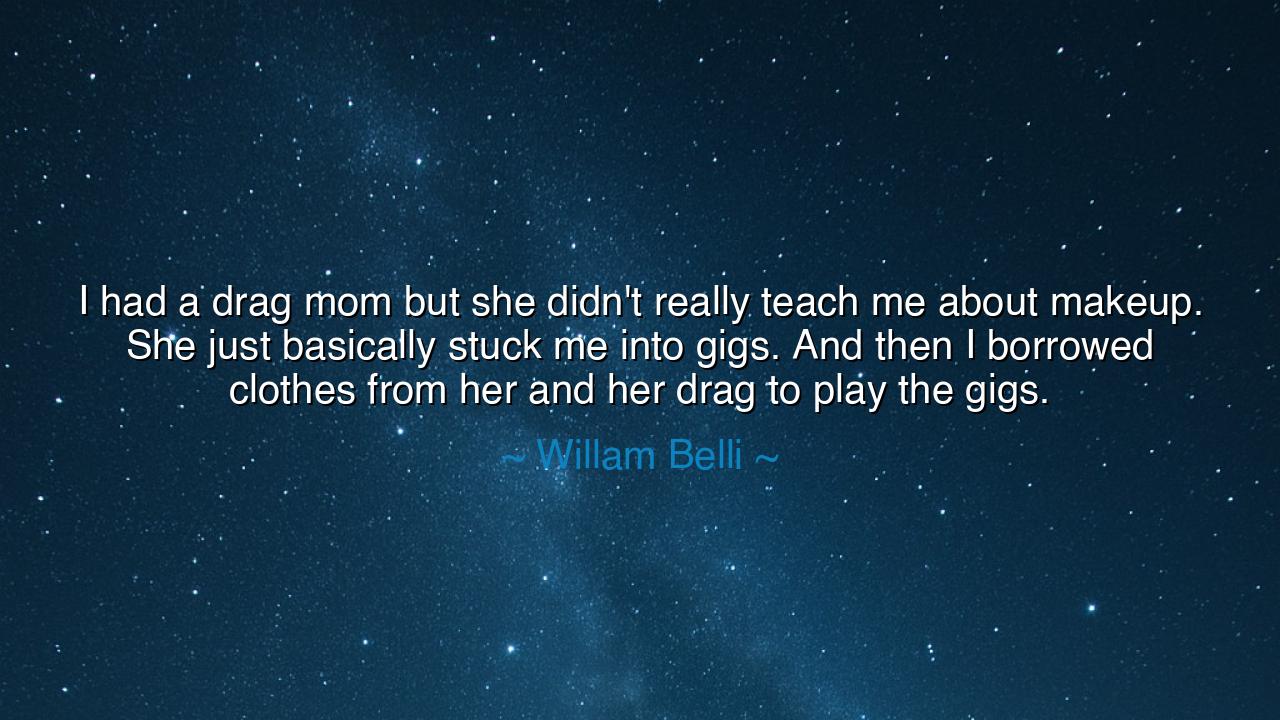
I had a drag mom but she didn't really teach me about makeup. She
I had a drag mom but she didn't really teach me about makeup. She just basically stuck me into gigs. And then I borrowed clothes from her and her drag to play the gigs.






When Willam Belli said, “I had a drag mom but she didn’t really teach me about makeup. She just basically stuck me into gigs. And then I borrowed clothes from her and her drag to play the gigs,” he was describing far more than the beginnings of a performer’s career — he was speaking to the ancient rhythm of apprenticeship, self-creation, and transformation. Beneath his witty candor lies a truth older than theater itself: that some teachers do not instruct through lessons, but through trial, experience, and immersion. His “drag mom” did not lecture or demonstrate; she cast him into the fire of performance — and from that fire, he forged himself.
The ancients would have recognized this kind of teaching. In the guilds of old, the blacksmith did not hand his apprentice a manual; he handed him a hammer. The sculptor did not teach through words but through the sound of chisel on stone. This was the wisdom of experiential learning, where doing became the sacred path to knowing. Willam’s drag mother, whether she intended to or not, passed on this same tradition. She offered not comfort, but challenge — not polish, but purpose. And so, what began as borrowed clothes and unrefined makeup became a crucible for identity, where the student learned to survive and then to shine.
In this way, Belli’s story mirrors the eternal theme of creation from chaos. Drag, like the theater of ancient Dionysus, is born of transformation — the shedding of one form to reveal another. Yet no one can be taught transformation; it must be lived. His mother’s “tough love” approach was not neglect, but initiation — a symbolic casting out of the apprentice into the world’s unpredictable stage. From the moment he first stepped into borrowed heels, he was not merely performing — he was becoming. The borrowed costume became the chrysalis from which authenticity emerged.
There is something deeply universal in his story. Every artist, every seeker, every soul who has walked the path of becoming knows this feeling — to be given little guidance but endless opportunity. The poet Rainer Maria Rilke once wrote, “The only journey is the one within.” So it was for Willam. His mother’s absence of instruction forced him inward — to listen, to experiment, to fail, and to find the truth of his art through the mirror of experience. What she withheld, he discovered within himself. What she denied him in comfort, she gave him in freedom to evolve.
It also speaks to the beauty of inheritance and reinvention. By borrowing his drag mother’s clothes, Willam was literally and symbolically stepping into a lineage — wearing the garments of those who came before him, while reshaping them into something uniquely his own. This act of borrowing and becoming echoes the mythic cycle of students surpassing their masters, of generations taking the tools of their ancestors and crafting new forms. Just as Daedalus taught Icarus to fly, though the flight would become his own, so too does every artist take what is given and make it soar in a new direction.
And beyond artistry, his words illuminate a deeper truth about self-reliance. The drag world, like life itself, is not always gentle — it tests, it demands, it refines. His mother’s style of mentorship forced him to rely on resilience, creativity, and willpower. To be “stuck into gigs” without full preparation is to be reminded that growth often begins in discomfort. The ancients called this initiation by ordeal — the process by which the untested are made strong through struggle. For it is not comfort that awakens greatness, but the necessity to adapt, to improvise, to transform chaos into art.
So let this be the lesson passed down to future generations: Do not resent the teacher who gives you little instruction, for they may be giving you the greatest gift — the freedom to discover your own voice. Borrow what you can, learn from those who came before, but never forget to reshape it into your truth. For the clothes you borrow today will one day become your own — imbued with your sweat, your laughter, your defiance, your light.
In the end, Willam Belli’s reflection is not merely a tale of drag and performance — it is a parable of creation. It reminds us that identity is not handed down like a manual, but crafted in the crucible of experience. Every stage, every mistake, every borrowed costume is a step toward the divine act of self-making. And when you finally stand in your own light, you will realize that the lessons you longed for were there all along — hidden in the fire, waiting for you to dance.






AAdministratorAdministrator
Welcome, honored guests. Please leave a comment, we will respond soon